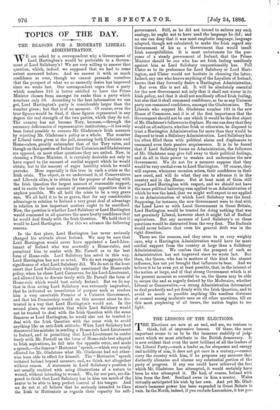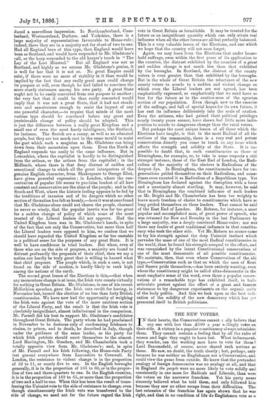THE LESSONS OF THE ELECTIONS. duced a marvellous impression. In
Northumberland, Cum- berland, Westmoreland, Durham, and Yorkshire, there is a large majority of representatives favourable to Home-rule ; indeed, there they are in a majority not far short of two to one. Had all England been of this type, then England would have been as Scotland, and would have responded to Mr. Gladstone's call, as the harp responded to the old harper's touch in " The Lay of the Last Minstrel." But all England was not as Scotland, and highly as we esteem Mr. Gladstone's genius, it is well for her that it is not so. No great Empire could exist, if there were no more of stability in it than would be • implied by the fact that any really great man could change its purpose at will, even though he had failed to convince the more sturdy statesmen among his own party. A great State ought not to be easily converted from one purpose to another ; the very fact that it could be thus easily converted would imply that it was not a great State, that it had not steadi- ness and massiveness enough to resist the impact of any one powerful character,—to require that minds of the most various type should be convinced before any great and irretrievable change of policy should be adopted. This is just the difference between a really great Kingdom and a small one of even the most hardy intelligence, like Scotland, for instance. The Scotch are a canny, as well as an educated people, but they are too much cast in the same mould to resist the gust which such a magician as Mr. Gladstone can bring down from their mountains upon them. Even the North of England responds too easily to i he same influence. But in Lancashire, where the capitalist is hardly to be distinguished from the artisan, or the artisan from the capitalist ; in the Midlands, where there is that deep distrust of sudden and sensational change to which all the great interpreters of the genuine English character, from Shakespeare to George Eliot, have given powerful expression ; in London, where the con- centration of popular life seems to proclaim loudest of all how constant and conservative are the aims of the people; and in the South and West, where the historic feeling appears to be fed by the traditions of invasion and of its dangers which no other section of thenation has felt so keenly,—here it was at once found that Mr. Gladstone alone could not charm the people, charmed he never so wisely, that the popular inertia was far too great for a sudden change of policy of which some of the most trusted of the Liberal leaders did not approve. Had the United Kingdom been wax in Mr. Gladstone's hands, in spite of the fact that not only the Conservative, but more than half the Liberal leaders were opposed to him, we confess that we should have regarded the United Kingdom as far too unstable in a political sense for the purposes of any great State. It is well to have confidence in tried leaders. But when, even of those who are on the side of progress, a majority are found to distrust profoundly the proposals of their chief, then we say a nation can hardly be truly great that is willing to hazard what that chief proposes. The people which, in such a case, is not found on the side of caution, is hardly likely to rank high among the nations of the earth.
The second great lesson of the Elections is this,—that when any momentous change is at issue, the Irish vote counts virtually for nothing in Great Britain. Mr. Gladstone, in one of his recent Midlothian speeches, gave the Irish vote credit for having, in November last, turned the election of no less than forty British constituencies. We have now had the opportunity of weighing the Irish vote against the vote of the more cautious section of the Liberal Party, and the result is that the Irish vote is absolutely insignificant, almost infinitesimal in the comparison. Mr. Parnell did his best to support Mr. Gladstone's candidates throughout Great Britain. The party whom he had proclaimed in November to be desirous only of condemning Irishmen to chains, to prison, and to death, he described in July, though under the guidance of the same leader, as the party for which Irish patriots should exert themselves to the utmost. Lord Harlington, Mr. Goschen, and Mr. Chamberlain took a totally opposite view from Mr. Gladstone's ; and, in spite of Mr. Parnell and his Irish following, the Home-rule Party lost ground everywhere from Lancashire to Cornwall. In London, the resistance to violent change is in the proportion of 52 to 11, or nearly five to one. In the English boroughs generally, it is in the proportion of 165 to 60, or in the propor- tion of two and three-quarters to one. In the English counties, it is in the proportion of 169 to 65, or more than the proportion of two and a half to one. When this has been the result of trans- ferring the Unionist vote to the side of resistance to change, even though simultaneously the Irish vote was transferred to the side of change, we need not for the future regard the Irish vote in Great Britain as formidable. It may be treated for the future as an insignificant quantity which can only attain real influence when all the other forces are all but perfectly balanced. This is a very valuable lesson of the Elections, and one which we hope that the country will not soon forget.
Again, we may learn from the Elections that under house- hold suffrage, even within the first years of its application to the counties, the distrust exhibited by the counties of a great and sudden change is not much less than that exhibited by the boroughs. In Scotland, the distrust of the county voters is even greater than that exhibited by the boroughs. But in the whole of Great Britain the reluctance of the new county voters to accede to a sudden and violent change on which even the Liberal leaders are not agreed, has been emphatically expressed, so emphatically that we need have no fear for the future as to the cautiou,ness of the agrarian section of our population. Even .though new to the exercise of the suffrage, and full of special hopes for its own future, it has cast its influence deliberately into the scale of caution. Even the artisans, who had gained their political privileges nearly twenty years sooner, have shown but little more indis- position to accede to dangerons change than the rural voters.
But perhaps the most unique lesson of all those which the Elections have taught, is that in the most Radical of all the sections of the community, there is a very real and potent conservatism directly you come to touch on any issue which affects the strength and solidity of the State. • It is im- possible to doubt that, in such constituencies as those of Birmingham, for example, or, to take in some respects a still stronger instance, those of the East End of London, the Radi- calism of the majority of the electors is Radicalism of the deepest dye. In Birmingham, the constituencies have for two generations prided themselves on their Radicalism, and some- times even vaunted it as Radicalism of a Republican type. Yet Birmingham has declared against the disruption with a force and a unanimity almost startling. It may, however, be said, that in Birmingham the combined influence of such leaders as Mr. Bright and Mr. Chamberlain has been too weighty to leave much freedom of choice to constituencies which have so long prided themselves on these leaders. That cannot be said of the East End of London. Mr. Robson, for instance, a most popular and accomplished man, of great power of speech, who was returned for Bow and Bromley in the last Parliament by a large majority, was a deeply convinced Home-ruler; nor was there any leader of great traditional influence in that constitu- ency who took the other side. Yet Mr. Robson no sooner came to try his strength against the deep Unionist instinct which pervades the mass of one of the most Radical constituencies in the world, than he found his strength unequal to the effort, and was vanquished by the latent Constitutional conservatism of one of the most democratic of all possible constituencies. We maintain, then, that even where Conservatism of the old
type,—Conservatism such as that on which the men of Kent and Sussex pride themselves,—has been entirely wanting, even where the constituency might be called ultra-democratic in the most emphatic sense of the word, even there a popular conser- vatism of a remarkable type has exhibited itself, in half- articulate protest against the effort of a great and famous statesman to try dangerous experiments on the organic unity of the body politic. And this we look upon as the best indi- cation of the solidity of the new democracy which has yet presented itself to British politicians.



































 Previous page
Previous page